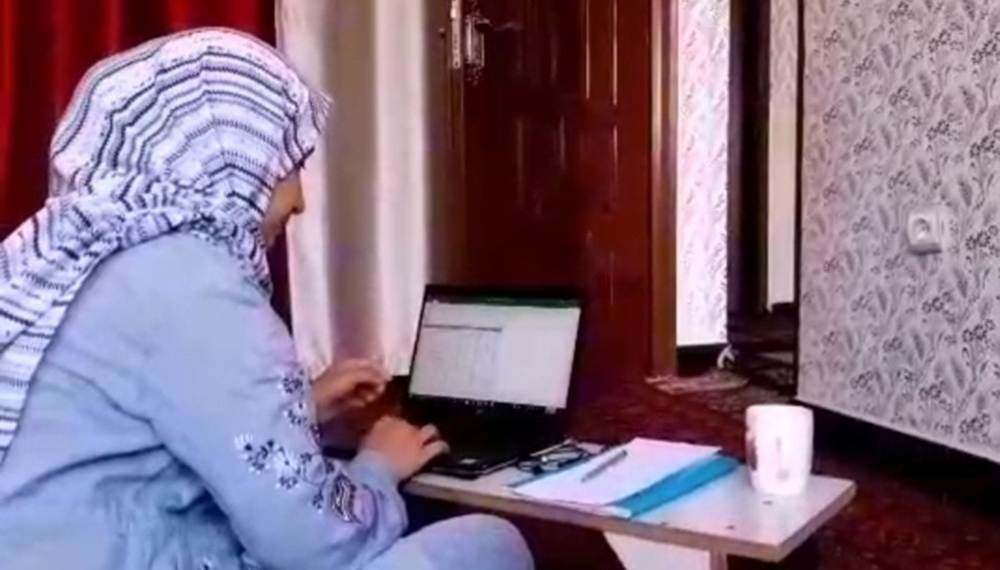By Ziba Balkhi
It was one day after Afghanistan’s new rulers closed girls’ high schools when Basira Mohammadi decided she would teach lessons through the online video sharing platform YouTube.
While Basira didn’t launch her channel that day in 2021, the seed was planted and her work began. Now she produces content on YouTube about computer training programs.
“I decided to create a YouTube channel for two purposes,” the 22-year-old said. “First, to help my sisters [other Afghan women] so that they can take advantage of this opportunity, and second to keep up to date with computer skills.”
Basira studied law and political science at Kabul University, but she learned computer skills in a program run by an international NGO.
“With educational centers completely closed, no one can study or even attend a course and learn necessary skills that are very important in society today. This situation motivated me to create the YouTube channel,” Basira said.
She uploads three to four videos a week and is currently working on an explainer for Microsoft Word. Future content will cover Excel, PowerPoint, Outlook, and other essential computer skills, she said.
Basira was teaching English in a language school in Kabul before the collapse of Afghanistan’s government in 2021. When the Taliban imposed restrictions on educational centers more than a year later, she also lost her job.
“My only wish was that since girls cannot go to courses to learn something, at least I can help my friends to learn computer programs in this way,” she said.
Many similar channels have appeared in recent months, run by girls in Balkh province. The content is often practical, teaching skills including painting, English language, and makeup hair and beauty training.
The Taliban has also introduced restrictions on media with outlets heavily controlled in terms of what is televised or published. Most of the entertainment, drama, and critical current affairs programs by domestic media have been eliminated.
The Taliban’s de facto Ministry of Information and Culture has attempted to regulate YouTube by introducing a content creators’ registration for those publishing on the platform. This was not a requirement before the group took control of the country in 2021.
Similar to domestic media regulation, the Taliban requires every YouTube channel to be registered for 4,000 afghanis (around USD$60) and a deposit of 10,000 afghanis (USD $145) per channel.
“I don’t think it’s right. It makes a person who wants to serve society and her gender to stop trying and become closed off, but ignoring these limitations, I’ve created my YouTube channel and I do everything in my power to serve my gender,” Basira said.
YouTuber Hamaira*, 20, launched her art channel eight months ago. She says that since the fall of the Republican government, art is one of the sectors that has been most impacted.
“During the previous government, sometimes there were exhibitions set up to display our art to others, or if someone was interested in learning painting, they could go to classes and learn professionally. But now such activities are not favorable due to the restrictions imposed on women and on art,” she told Rukhshana Media.
Hamaira learned painting professionally five years ago at a school in Mazar-e-Sharif, saying she mostly draws pictures of nature and portraits and uploads two videos a week on her YouTube channel.
“Today’s world is a digital world. Every moment I make a video is very pleasing to me because I always think of helping people, especially women, in any way I can,” she said.
“Life is not without problems. But this situation is not permanent. Let’s try to turn the challenge into an opportunity and make the most of it. Today, there are ways that we can use to create opportunities.”
Nafisa*, 28, was working as a beautician when the Taliban forced all salons to close this year. Afterwards, Nafisa decided to create YouTube videos to demonstrate her work and teach others.
“I attract customers through the videos I put up and I post videos that woman can watch and do their makeup at home,” Nafisa said.
Arash*, a university professor and journalist in Balkh province, said YouTube content, along with other social networks, can be a new arena for women’s struggle against restrictions.
“We are unfortunately witnessing Taliban restrictions on the presence of women, women’s work and women’s education every day,” Arash said.
“The restrictions on women grow more and more narrow. These women had tried for the past 20 years to achieve so that their voices would be heard. But in the last two years, the Taliban has tried to take this ability from women.”
The professor says in terms of communication, he regards the rise of social media channels effective and a source of hope.
“We’ve recently have witnessed many YouTube channels created since women were deprived of education, and they are producing appropriate and good educational content,” he said.
“They want to portray that women are strong and do not lose hope under Talib limitations. They work and fight in every possible way and YouTube channels have become one of these ways. It can be a good way to seek justice for women.”
*Note: Most of the interviewees are using pseudonyms at their request








